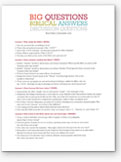Unfortunately, many today confess Jesus as Savior yet don’t even realize how other worldviews have affected their own thinking. Whether it is Post-Modernism or Secular Humanism or whatever “ism” you want to name, Christians using other worldviews will be unconsciously shaped by their assumptions. Just like wearing someone else’s glasses affects your vision, so using [&hellip
In the last blog I mentioned Nancy Pearcey calling Christianity ‘Total Truth.” This total truth, a Christian worldview, is a biblically informed perspective on the world. Christianity starts with the presupposition that God exists due to the order in the universe and the moral order in the world. God reveals Himself generally through nature and [&hellip
A third test for a worldview is whether it is useful or relevant in life. A Secular Humanist may state that there are no gods, no life after death, no ultimate foundation for ethics, no ultimate meaning in life, and no free will. Since these implications stem from evolution—that the universe came about all by [&hellip
A second test for a worldview is that it doesn’t have contradictions. If something is logically inconsistent, it cannot be true. Refer to the dictionary definition of truth: “conformity to knowledge, fact, actuality, or logic.” For example, you can’t be a married bachelor. Or take Secular Humanism’s stance on ethics, or how to behave, which [&hellip
I read a blog from Chuch Colson at BreakPoint that fits perfectly into the question of whether a worldview is true or not. There is an atheist who argues that even though Christianity may not be true it is useful for a good society. Read the blog “Fillet of Faith” http://www.breakpoint.org/bpcommentaries/entry
People can believe whatever they want, but that doesn’t make it true. I can believe that I can fly, but when I fall off the roof instead of zooming through the sky, the truth (and the ground) smacks me in the face. So it is with worldviews. You can believe what you want—but is it [&hellip
Let’s conclude the explanation of worldview components. All worldviews have to answer fundamental questions. These are questions that all people ponder—issues that are universal to all humans. The questions that all want answered are: Where did we come from? Why are we here? What can we do about evil and suffering? And what happens when [&hellip
What is right and wrong? How do we decide? Is there anything wrong with anything? As we continue to examine worldview components, we come upon their ethical stance. All worldviews have beliefs about how to live. Recall that according to atheism, no God exists. Furthermore, Secular Humanism believes that there is no supernatural realm, just [&hellip
Let’s continue to discuss the components of a worldview. All worldviews have beliefs about reality and the source of everything. Another term for this is a philosophy. Some believe in naturalism—the belief that reality is only comprised of matter, or natural things, with no supernatural realm. Everything that exists is just what we see in [&hellip
Continuing from the last blog about worldviews: If a worldview is the truth claims that explain the world and reality, like a map, what are these specific claims? First, all begin with religious or philosophical assumptions—even if they claim not to. If we do not grasp this fact, we miss a key witnessing opportunity when [&hellip





















0
Comments
Add